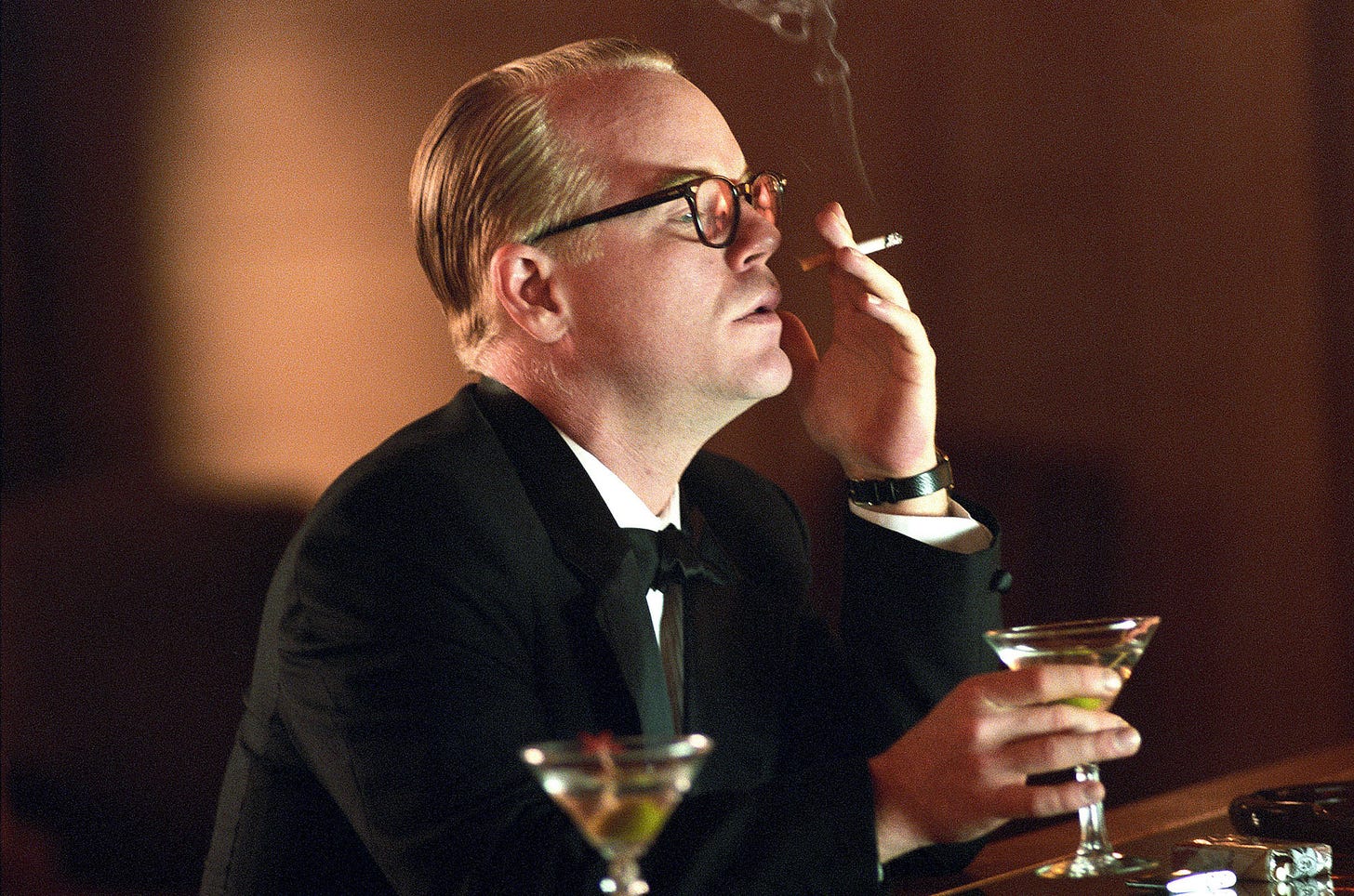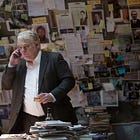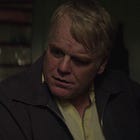Capote (2005) and a final farewell to Philip Seymour Hoffman (part 3)
“More tears are shed over answered prayers than unanswered ones”

Accepting the Oscar for Best Actor in a Leading Role at the 78th Academy Awards, Philip Seymour Hoffman ran through the usual roll call of thanks, from the actors he beat to the golden Hollywood award (Terrence Howard for Hustle and Flow, Heath Ledger for Brokeback Mountain, Joaquin Phoenix for Walk The Line and David Strathairn for Good Night, and Good Luck) to his friends and the film’s producers and especially so director Bennett Miller, before reserving his most heartfelt gratitude, as he should on this grandest of all occasions, to his mother and single parent of four children. After asking the audience to congratulate his mother (rather than him) if they see her in the auditorium, Philip threw his arms wide gently, his Oscar in one hand, the nominations card in the other, and simply said “We’re at the Party, Ma!” before beaming with pride that his mother’s passions became his passions and “Be proud Mum, because I’m proud of you”.
The mark of the man and another reason for my missing his presence in movies so very much.
Philip’s portrayal of American novelist Truman Capote is a wondrous thing and rarely if ever do I change my opinion on a particular protagonist in a film, but I did last evening. Naturally when you rewatch a film you’ll spot something you hadn’t seen the first time, a scene perhaps or a host of tiny reasons for admiring a film so. You may also, over time, change your entire opinion of a film you once loved or hated, adored or despised, but my love for this film didn’t change last evening. What changed was that two decades ago I had no real opinion on what a difficult to like character/human being Truman Capote was. From an acting perspective, Philip’s performance is something to behold: the often difficult to decipher accent, the laughing giggle, the quiet and withdrawn introvert that bursts into the life and character of a gregarious writer determined to be liked, loved even, the centre of everyone’s attention. Then there’s the kind and tender side shown to a despicable human animal convicted of the most heinous of random violent crimes and a shared bond that borders on infatuation, love even, for another of life’s abandoned children as he admits “it’s as if Perry and I grew up in the same house” and “one day he stood up and went out the back door, while I went out the front”.
But what I hadn’t accounted for before rewatching last night and, it must be admitted, with no further insights at all into the real life character brilliantly brought to life by Philip in the two decades that have passed since I originally watched this film, was a quite distasteful narcissist and liar desperate for fame and attention. Perhaps the lies aren’t huge (and no doubt his writing is more truthful), but the lies shown also demonstrate a manipulative and ambitious user of people and their situations and I repeatedly jotted the term “user” in my trusty journal as I watched and it’s the primary reason for my choosing of the brief scene I’ve dissected below.
Just an opinion based wholly on a film, and a film that garnered five Oscar nominations and the single win for Philip. I adored Bennett Miller’s direction (as I hope I convey below), I’ve been in cinematic love with Catherine Keener for too many decades to admit and I continue to love Mychael Danna’s minimalist musical score.
The following collection of three scenes occur just after the midway point of the film…
From deep snow covering the outside of the prison we cut to the cold, dark cells of death row and “Truman Capote” (Philip Seymour Hoffman) sitting on the bed of his “friend” and beside “Perry Smith” (Clifton Collins Jr) as they discuss a book Truman has brought with him on this, his latest visit. Their good natured discussion is cut short as with a camera move from director Bennett Miller he first frames the two somewhat firm friends looking aghast at the cell opposite as a prisoner first refuses, then is forcibly removed from his cell and taken to “final holding” pending his execution. Director Miller cuts back and forth between the two men and the single prisoner being forced from his cell and now marched along the corridor between cells before settling his camera on a close-up of Smith and “next in line” in his own words, and aware of his soon to be fate. Now cutting between the two men, Truman begins to apologise for his recent absence and lack of visits before Smith interjects and eagerly asks for news on his book and when will it be possible for him to read it. “Very slowly” Truman lies in response, before extending his lie still further by lamenting “I’ve hardly written anything”.
We cut to Truman re-reading his notes and finishing a drink in a dressing room full of flowers and gifts backstage before the first reading of his new book “In Cold Blood” and quickly, another drink, this time as he waits behind the backstage curtain before being introduced to a packed auditorium, all of whom give him a rousing reception as he takes to the stage and “Hello, I’m Truman Capote”. His distinctive giggle follows, as does an introduction to the first of three parts of his new book he intends to read for the audience this evening as Miller first frames Truman from behind (and a vast audience in front of him) and then from an audience perspective, and through the darkness, a spotlight trained on the writer as he begins:
“The village of Holcomb stands on the high wheat plains of western Kansas, a lonesome area that other Kansans call “out there”. Until one morning in mid-November of 1959, few Americans in fact, few Kansans had ever heard of Holcomb. Like the waters of the Arkansas river…”
Camera cuts to Smith in his cell reading the book Truman gifted to him:
“…like the motorists on the highway, and like the yellow trains streaking down on the Santa Fe tracks, drama, in the shape of exceptional happenings, had never stopped there”
Miller’s camera returns to Smith as his eyes are drawn to a noise from an unseen area in the prison courtyard outside of his cell. A mournful violin begins, a distinctive change from Mychael Danna’s musical soundtrack hence far of beautiful, single notes from a piano, as Smith peers through an air vent in his cell at the outside courtyard area and a prisoner being led into the execution chamber opposite. We cut back to an audience perspective of Truman’s book reading, and a spotlight on the writer continuing to read from his eagerly awaited book:
“Perry Smith’s voice was both gentle and prim. A voice that, though soft, manufactured each word exactly, ejected it like a smoke ring issuing from a parson’s mouth”
Director Miller returns his camera to a present day Perry Smith still staring at the execution chamber opposite as the sound of an execution takes place and the faint sound of a prisoner falling through the trapdoor of a gallows:
“The four coffins, which quite filled the small, flower-crowded parlour, were to be sealed at the funeral services, very understandably, for despite the care taken with the appearance of the victims, the effect achieved was disquieting”
We cut to behind Truman now, facing a full auditorium:
“Nancy wore her dress of cherry-red velvet, her brother a bright plaid shirt”
And back to the audience view of Truman, alone on stage, a spotlight and his book his only company:
“The parents were more sedately attired, Mr. Clutter in navy-blue flannel, his wife in navy-blue crepe”
And back to a close-up of the author on stage:
“And it was this especially that lent the scene an awful aura, the head of each was completely encased in cotton, a swollen cocoon twice the size of an ordinary blown-up balloon”
Cut to an enraptured audience, hanging on Truman’s every word:
“And the cotton, because it had been sprayed with a glossy substance, twinkled like Christmas-tree snow”
Cut to the prisoner’s now dead body being taken from the execution chamber on the back of a red tractor:
“One Tuesday at dawn, a car load of strangers ignorant of the local disaster…”
Cut to Perry Smith still watching the red tractor through the air vent in his cell slowly ease away from the execution chamber:
“…were startled at what they saw as they crossed the prairie and passed through Holcomb. Windows ablaze , almost every window, on almost every house, and in the brightly lit rooms, fully clothed people, even entire families who had sat up the entire night, watchful, listening, of what were they frightened? It might happen again”
Now Miller’s camera finds “Nelle Harper Lee” (Catherine Keener) in the centre of the huge audience now affording Truman a standing ovation as he thanks them, repeatedly, and overcome with emotion, is visibly moved at the reaction his reading has received. Miller cuts between the two original collaborators and somewhat writing partners Truman and Harper Lee, before we find Truman once more in his element backstage and once more, the laughing and giggling centre of attention among a crowd of friends and well wishers. One particular fan stops at the doorway and exclaims “Your portrait of those men was terrifying. Terrifying” and after timidly walking away, Truman calls after him, playing to the crowd around him as he calls him “Dad!” and “Have any of you met my father?” before giggling and laughing to his heart’s content.
We cut to Truman backstage complaining to his magazine editor at The New Yorker “William Shawn” (Bob Balaban) that certain people he’d hope would attend, hadn’t. After William assures him that everyone came, Truman smiles broadly as he exclaims “Shall we do more?”. William responds that they should sit and wait, let people talk about the show and let them do their work for them, but he also boosts Truman beyond measure by stating his book will change everything and “change how people write”. Truman is overcome with the adulation pouring forth from his editor as he responds to his question as to when the book will be formally finished by confirming that he plans to return to Kansas tomorrow to talk to Perry for the final and most important part of his book. As William suggests he can lean on him now as he has nothing left to lose and he can finish his book once and for all, Truman wistfully laments “This may sound strange to you, but I’m going to miss him”.
Cut to Truman taking a deep breath before heading into Perry Smith’s death row cell block one final time…
Thanks for reading. I hope this message in a bottle in The Matrix finds you well, prospering, and the right way up in an upside down world.
Whilst you’re here I may as well brag about the release of my trilogy of recently self-published books. Beautiful covers eh! As the title(s) would suggest, this is my life at the movies or at least from 1980 to 2024, and in volume 1 you’ll find 80 spoiler free appraisals of movies from debut filmmakers, 91 of the very best films appraised with love and absent of spoilers from 1990–2024 in volume 2, and in volume 3 you’ll find career “specials” on Paul Thomas Anderson and Quentin Tarantino together with the very best of the rest and another 87 spoiler free film reviews from 2001–2024.
All available in hardback and paperback and here are some handy links:
"A Life at the Movies Vol.1" - link to Amazon
"A Life at the Movies Vol.2" - link to Amazon
"A Life at the Movies Vol.3" - link to Amazon







